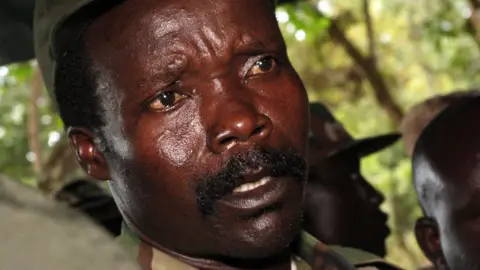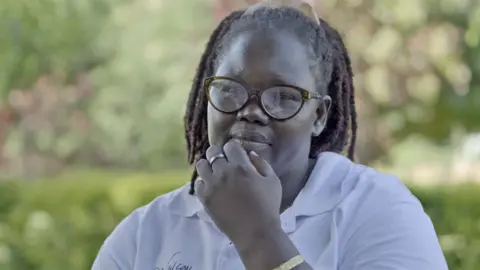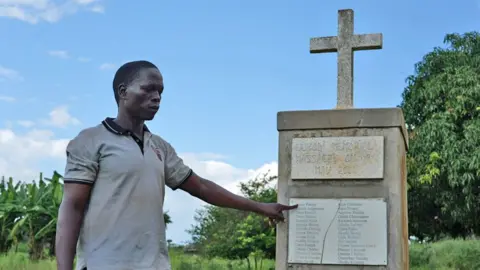 AFP via Getty Images
AFP via Getty ImagesSurvivors of the reign of terror inflicted by Lord’s Resistance Army (LRA) rebels in Uganda have told the BBC they welcome the move by the International Criminal Court (ICC) to confirm charges against the group’s leader Joseph Kony.
An arrest warrant was issued for him in 2005, but he remains at large – believed to be hiding in the Central African Republic (CAR).
On Thursday, the ICC said he was being charged with 39 counts of war crimes and crimes against humanity, including murder, rape, using child soldiers, sexual slavery and forced pregnancy.
A woman abducted by the LRA as a child and forced to become one of Kony’s wives said she hoped the move would renew efforts to capture him.
“I cannot be happy like other women who went to school. I need justice for women who went through abduction like me,” Evelyn Amon, 42, told the BBC.

She spent 11 years in the bush with the LRA after being abducted from her home at age 11 – and she said she even forgot her own name as the rebels called her Betty Achol.
Ms Amon said victims like her wanted him to be tried so they could get compensation from the court.
Kony’s ICC trial cannot begin unless he is arrested and present in court in The Hague.
The LRA was formed by Kony in the late 1980s in northern Uganda, where it said its goal was to install a government based on the biblical Ten Commandments.
The group, which was notorious for hacking off its victims’ limbs or parts of their faces and taking sex slaves, was eventually forced out of the country in 2005.
It moved to neighbouring Democratic Republic of Congo and was also active in South Sudan and the CAR, where remnants of the rebels are understood to have engaged in poaching and illegal mining.
Kony’s notoriety increased in 2012 because of a social media campaign to highlight the LRA’s alleged atrocities. The following year, the US offered a $5m (£3.8m) reward for information leading to his arrest.
Despite those efforts, and years of manhunts, he remains a fugitive – and the US and Ugandan armies officially ended their operations to track him down in 2017.
Twenty-eight-year-old Patrick Ochieng, who was born in LRA captivity after his mother was abducted and sexually assaulted, also hopes the confirmation of charges will lead to Kony’s capture.
“He should first be arrested. The victims who suffered can’t wait – some of these victims are already dying,” Mr Ochieng told the BBC.
“We grew up in the rebel barracks, deep in the forest,” he said.
He is among thousands of children who were forced to become child soldiers. His mother was killed by the rebels when he just five years old.
“She tried to escape with us – me and my twin sister – but the policy was clear: if you try to escape and you’re caught, they [must] finish you. They’ll kill you,” the visibly emotional young man said.
Over nearly two decades in northern Uganda during the LRA insurgency more than 100,000 people were killed, between 60,000 and 100,000 children were abducted and 2.5 million people fled their homes – many moving into camps for better protection.

But these also came under attack, like one in the village of Lukodi, just a few kilometres from the town of Gulu. More than 70 people, including women and children, were killed there in 2004.
Muhammad Olanya, who was 17 at the time, still remembers that night vividly.
“We heard strange sounds like drumbeats followed by whistles – those were bullets,” he told the BBC.
“I ran, but by the time I reached the market, I was exhausted. I sat down by the roadside.”
He was lucky not to be abducted as he was rescued by a Ugandan army officer.
But he says the conflict devastated his life – he lost relatives and got no formal education.
There were attempts by the Ugandan government to strike a peace deal with Kony, but talks fell apart in 2008 because the LRA leader wanted assurances that he and his allies would not be prosecuted.
The victims hope the ICC’s decision to press forward with the confirmation of charges without him present means the LRA leader will one day be held accountable.
More BBC stories on the LRA:
 Getty Images/BBC
Getty Images/BBC
